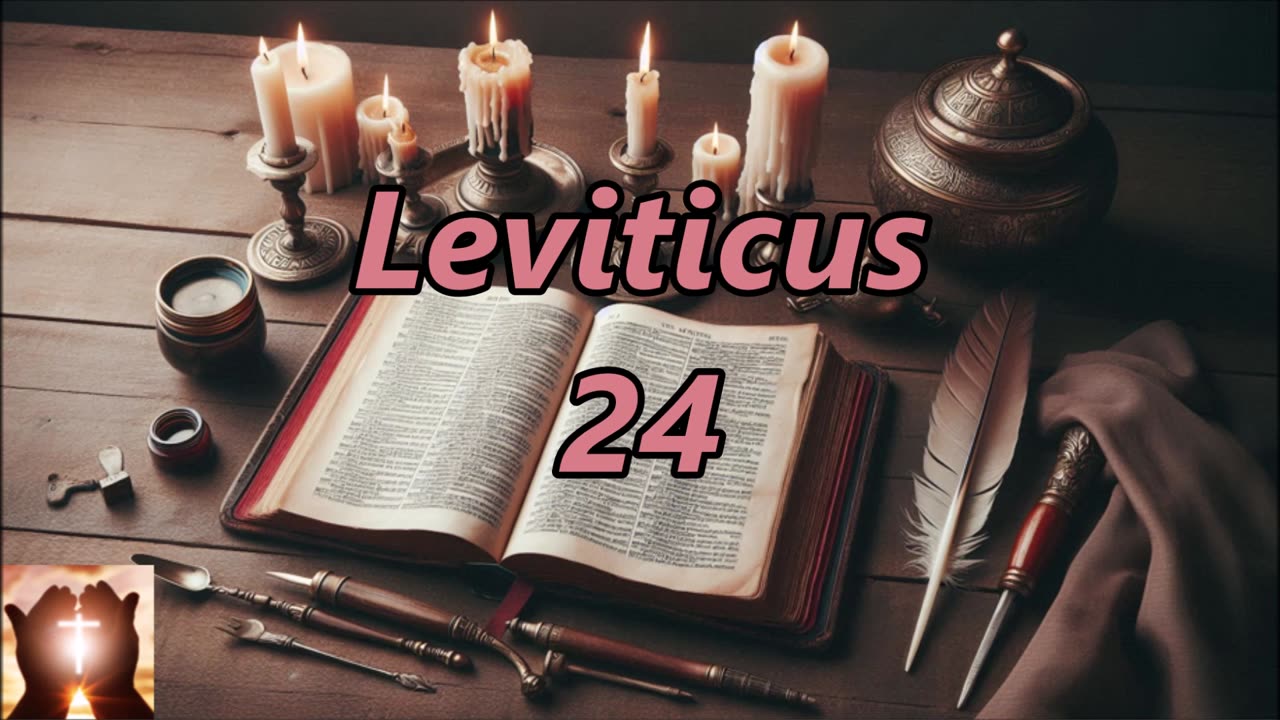Premium Only Content

Leviticus 24
The Lampstand (v.1–4)
Pure olive oil was to be provided continually to keep the lamp burning before the Lord.
Aaron (the high priest) was responsible for tending the lamp daily, symbolizing God's eternal light and presence.
The Bread of the Presence (Showbread) (v.5–9)
Twelve loaves of fine flour were to be placed in two rows on the table every Sabbath.
Symbolized God’s covenant with the twelve tribes of Israel.
Only priests could eat the bread, in a holy place, after it was replaced.
The Case of the Blasphemer (v.10–16)
A man (of mixed Israelite-Egyptian parentage) blasphemes the name of the Lord in a fight.
He is brought to Moses and placed in custody until God gives judgment.
The punishment is stoning, and God commands that anyone who blasphemes His name shall bear the guilt and face death.
Reverence for God's name is sacred and non-negotiable.
Principles of Justice (v.17–23)
Clear rules are given for punishment of personal injury:
Life for life
Eye for eye
Tooth for tooth
This was not about vengeance, but fair, proportionate justice.
The same law applied to both Israelites and foreigners.
Key Themes:
Holiness in worship – Daily devotion (lamp), weekly remembrance (bread).
Reverence for God's name – His name must not be treated lightly.
God’s justice is fair and impartial – Law is consistent for all people.
God is present among His people – Symbolized by light and bread.
Application for Today:
Maintain spiritual disciplines – Like tending the lamp and changing the bread, keep your spiritual life regularly fueled and refreshed.
Honor God’s name – In speech and in life, treat God’s name with awe and reverence.
Practice justice – Be fair, consistent, and unbiased in how you treat others.
Include others – God's justice and presence extend to all, regardless of background.
-
 LIVE
LIVE
Badlands Media
3 hours agoBaseless Conspiracies Ep. 152
13,853 watching -
 LIVE
LIVE
Inverted World Live
2 hours agoTrump's Medbeds | Ep. 115
4,879 watching -
 2:03:41
2:03:41
TimcastIRL
3 hours agoTrump To Deploy National Guard To Chicago, Federal TAKEOVER Begins | Timcast IRL
164K94 -
 LIVE
LIVE
PandaSub2000
8 hours agoLIVE 10pm ET | SILENT HILL F w/TinyPandaFace
205 watching -
 1:26:00
1:26:00
Glenn Greenwald
8 hours agoNick Fuentes On Censorship, Charlie Kirk's Assassination, Trump's Foreign Policy, Israel/Gaza, the Future of the GOP, and More | SYSTEM UPDATE #523
90.5K255 -
 LIVE
LIVE
StevieTLIVE
4 hours ago#1 Kar98 Warzone POV Monday MOTIVATION
64 watching -
 LIVE
LIVE
a12cat34dog
3 hours agoTHE *NEW* SILENT HILL :: SILENT HILL f :: IS IT GOOD!? {18+}
105 watching -
 1:00:21
1:00:21
Akademiks
2 hours agonba youngboy live show.
23.5K1 -
 LIVE
LIVE
The Quartering
2 hours agoThey Just Stopped Another Attack, Trump Defeats Youtube, Hasan PIker Meltdown & More
1,889 watching -

megimu32
2 hours agoOn The Subject: Football Movies of the 90s & 2000s
1.18K3